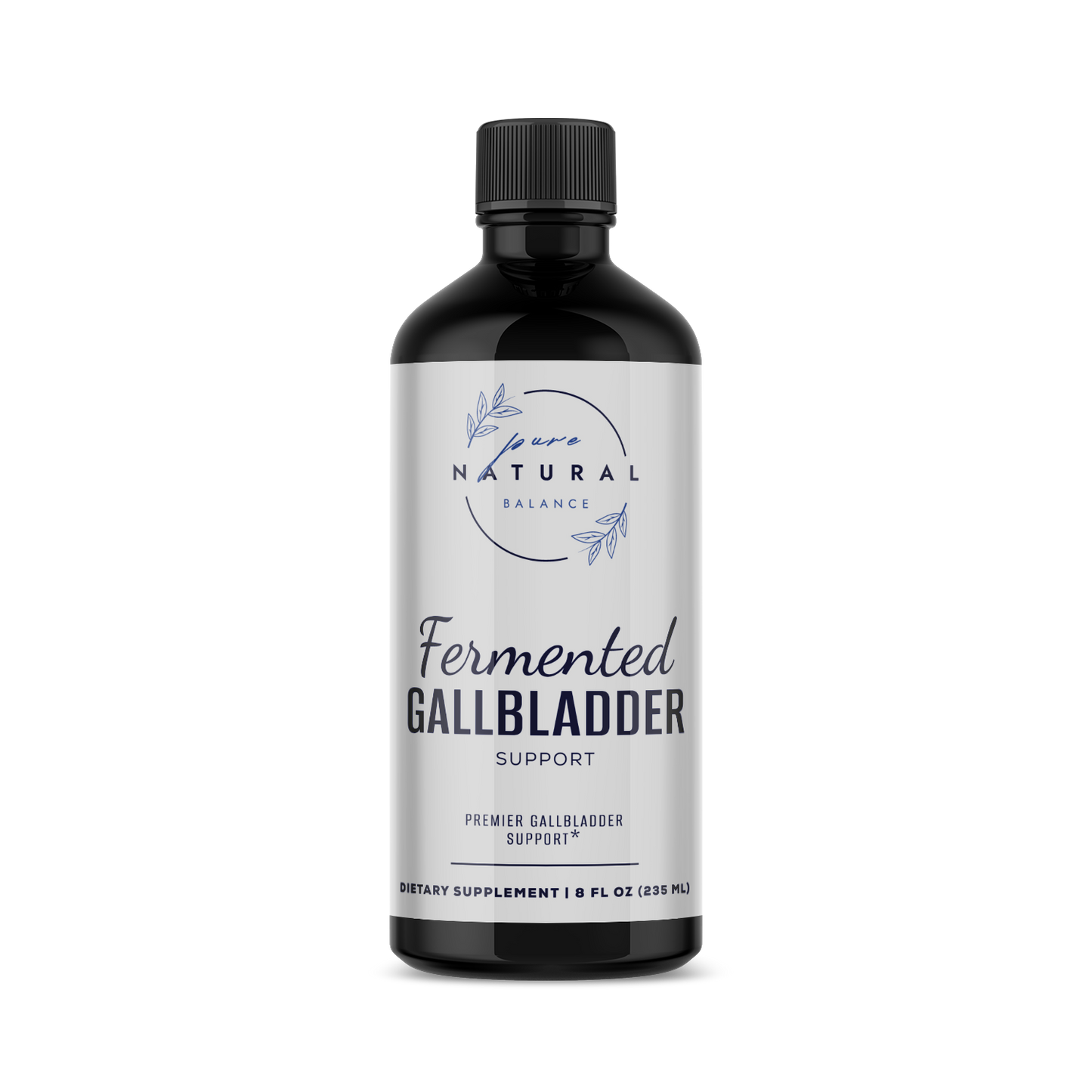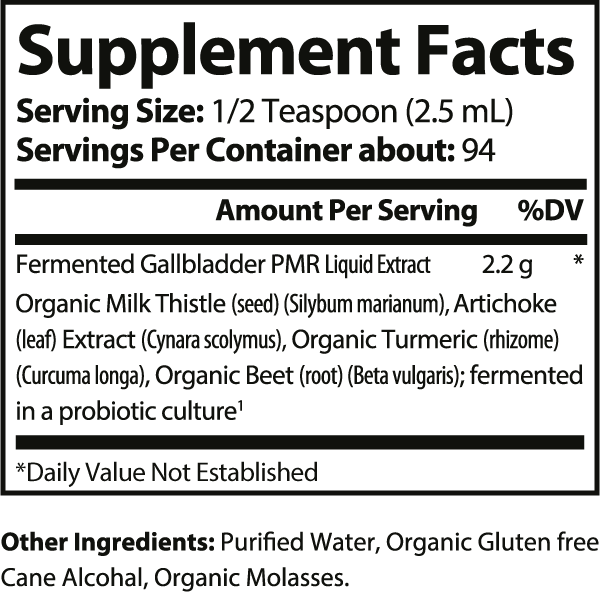Medical Grade Supplement Line
Fermented Gallbladder Support 8 fl oz
Fermented Gallbladder Support 8 fl oz
Couldn't load pickup availability
|
Formula Purposes & Benefits |
|
Fermented Gallbladder Support 8oz, is developed based on cutting-edge scientific research and expert formulation to gallbladder health, healthy bile metabolism, and immune health. Fermented Gallbladder Support 8oz utilizes probiotic nutrient fermentation technology. Our formula utilizes innovative ND Technology™ offering rapid oral delivery and remarkable bioenergetic properties. The superior nutrient delivery system of Rocktomic’s Fermented Gallbladder Support 8oz provides comprehensive support for optimal gallbladder function. Our formula is proudly made in the USA in an FDA registered facility, following Good Manufacturing Practices (GMP) standards. Our commitment to excellence is reflected in the fact that only 4% of the supplements on the market can match our world-class standards. |
|
Formula Ingredient Deck |
Benefits Of Each Ingredient |
|
Organic Milk thistle |
● May support liver health, aids as antioxidants, and reduces inflammation (345) ● May support liver health via high amounts of Silymarin which reduces lipid peroxidation and inhibits binding of toxins to the hepatocyte cell membrane receptors (345). |
|
Artichoke (leaf) Extract
|
● May support digestive health, influencing lipid metabolism, and regulates glucose and insulin levels (268,269). |
|
Organic Turmeric |
● May support antioxidant, cardio-protective, anti-inflammatory, anti-microbial, nephro-protective, hepato-protective, immunomodulatory, and anti-rheumatic effects (123). ● May reduce inflammation via decreases of inflammatory markers such as c-reactive protein, interleukin 6, tumor necrosis factor, and decreased cytokine production (123). ● May support joint health via decreases in connective tissue inflammation and improved pain in individuals with osteoarthritis (122). ● May support blood sugar regulation via increased pancreatic beta cell function and improved insulin sensitivity (121). ● May support cardiovascular and liver health via reduced accumulation of advanced glycation end products (AGE), reduced lipid peroxidation, and improved vascular function. ● Curcumin may exhibit antioxidant activity via scavenging of superoxide anion (∙O2−∙) and hydroxyl radicals (∙OH) (scavenging of inflammation molecules) (118,119). ● Curcumin may modulate breast carcinogenesis through its effect on cell cycle and proliferation, apoptosis, senescence, cancer spread and angiogenesis (119). ● May target cancer growth pathways such as the NFkB, PI3K/Akt/mTOR, MAPK and JAK/STAT, (119). |
|
Organic Beetroot |
● May support cardiovascular, immune health, reduced blood pressure, and optimizes exercise performance (87). ● High in antioxidants such as ascorbic acid, carotenoids, phenolic acids, flavonoids, polyphenols, and anti-inflammatory compounds (betalains) (87). ● Betalains have been shown to inhibit inflammatory pathways (Nuclear Factor-Kappa B “NF-κB”) that manifest in a plethora of chronic diseases (87). ● Increases nitric oxide production optimizing healthy blood pressure and enhanced cardiovascular output during exercise (87). ● Beetroot may support anti-carcinogenic activity by possibly inhibiting cancer cell growth mechanisms (cell proliferation, angiogenesis, and tumorigenesis) (87). |
|
Proper Use of This Supplement |
|
|
Our Formula Vs Other Formulas on the Market.
|
|
|
|
1. Our formula is GMP certified and made in an FDA registered facility. |
1. Source cheap ingredients from heavily polluted soils. |
|
2. High quality fermented herbs in a bioavailable and efficaciously dosed formula and utilizes nutrient fermented technology. |
2. Uses cheap herbs that may have heavy metals due to poor product quality and fillers. |
Sources:
- Clifford, T., Howatson, G., West, D. J., & Stevenson, E. J. (2015). The potential benefits of red beetroot supplementation in health and disease. Nutrients, 7(4), 2801–2822. https://doi.org/10.3390/nu7042801
- Chilelli, N. C., Ragazzi, E., Valentini, R., Cosma, C., Ferraresso, S., Lapolla, A., & Sartore, G. (2016). Curcumin and Boswellia serrata Modulate the Glyco-Oxidative Status and Lipo-Oxidation in Master Athletes. Nutrients, 8(11), 745. https://doi.org/10.3390/nu8110745
- Barzegar, A., & Moosavi-Movahedi, A. A. (2011). Intracellular ROS protection efficiency and free radical-scavenging activity of curcumin. PloS one, 6(10), e26012. https://doi.org/10.1371/journal.pone.0026012
- Banik, U., Parasuraman, S., Adhikary, A. K., & Othman, N. H. (2017). Curcumin: the spicy modulator of breast carcinogenesis. Journal of experimental & clinical cancer research : CR, 36(1), 98. https://doi.org/10.1186/s13046-017-0566-5
- Suhett, L. G., de Miranda Monteiro Santos, R., Silveira, B., Leal, A., de Brito, A., de Novaes, J. F., & Lucia, C. (2021). Effects of curcumin supplementation on sport and physical exercise: a systematic review. Critical reviews in food science and nutrition, 61(6), 946–958. https://doi.org/10.1080/10408398.2020.1749025
- Pivari, F., Mingione, A., Brasacchio, C., & Soldati, L. (2019). Curcumin and Type 2 Diabetes Mellitus: Prevention and Treatment. Nutrients, 11(8), 1837. https://doi.org/10.3390/nu11081837
- Ashtary-Larky, D., Rezaei Kelishadi, M., Bagheri, R., Moosavian, S. P., Wong, A., Davoodi, S. H., Khalili, P., Dutheil, F., Suzuki, K., & Asbaghi, O. (2021). The Effects of Nano-Curcumin Supplementation on Risk Factors for Cardiovascular Disease: A GRADE-Assessed Systematic Review and Meta-Analysis of Clinical Trials. Antioxidants (Basel, Switzerland), 10(7), 1015. https://doi.org/10.3390/antiox10071015
- Mata, I., Mata, S., Menezes, R., Faccioli, L. S., Bandeira, K. K., & Bosco, S. (2020). Benefits of turmeric supplementation for skin health in chronic diseases: a systematic review. Critical reviews in food science and nutrition, 1–15. Advance online publication. https://doi.org/10.1080/10408398.2020.1798353
- Varshney, R., & Budoff, M. J. (2016). Garlic and Heart Disease. The Journal of nutrition, 146(2), 416S–421S. https://doi.org/10.3945/jn.114.202333
- Fu, E., Tsai, M. C., Chin, Y. T., Tu, H. P., Fu, M. M., Chiang, C. Y., & Chiu, H. C. (2015). The effects of diallyl sulfide upon Porphyromonas gingivalis lipopolysaccharide stimulated proinflammatory cytokine expressions and nuclear factor-kappa B activation in human gingival fibroblasts. Journal of periodontal research, 50(3), 380–388. https://doi.org/10.1111/jre.12217
- Ried K. (2020). Garlic lowers blood pressure in hypertensive subjects, improves arterial stiffness and gut microbiota: A review and meta-analysis. Experimental and therapeutic medicine, 19(2), 1472–1478. https://doi.org/10.3892/etm.2019.8374
-
Darooghegi Mofrad, M., Milajerdi, A., Koohdani, F., Surkan, P. J., & Azadbakht, L. (2019). Garlic Supplementation Reduces Circulating C-reactive Protein, Tumor Necrosis Factor, and Interleukin-6 in Adults: A Systematic Review and Meta-analysis of Randomized Controlled Trials. The Journal of nutrition, 149(4), 605–618. https://doi.org/10.1093/jn/nxy310
- Fan, C. H., Cao, J. H., & Zhang, F. C. (2016). The prebiotic inulin as a functional food - a review. European review for medical and pharmacological sciences, 20(15), 3262–3265.
- Ahmed, W., & Rashid, S. (2019). Functional and therapeutic potential of inulin: A comprehensive review. Critical reviews in food science and nutrition, 59(1), 1–13. https://doi.org/10.1080/10408398.2017.1355775
-
Eisvand, F., Razavi, B. M., & Hosseinzadeh, H. (2020). The effects of Ginkgo biloba on metabolic syndrome: A review. Phytotherapy research : PTR, 34(8), 1798–1811. https://doi.org/10.1002/ptr.6646
- Chan, Y. S., Cheng, L. N., Wu, J. H., Chan, E., Kwan, Y. W., Lee, S. M., Leung, G. P., Yu, P. H., & Chan, S. W. (2011). A review of the pharmacological effects of Arctium lappa (burdock). Inflammopharmacology, 19(5), 245–254. https://doi.org/10.1007/s10787-010-0062-4
- Alazadeh, M., Azadbakht, M., Niksolat, F., Asgarirad, H., Moosazadeh, M., Ahmadi, A., & Yousefi, S. S. (2020). Effect of sweet fennel seed extract capsule on knee pain in women with knee osteoarthritis. Complementary therapies in clinical practice, 40, 101219. https://doi.org/10.1016/j.ctcp.2020.101219
Share




